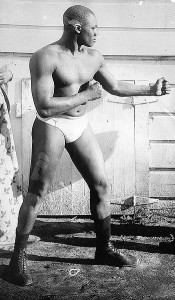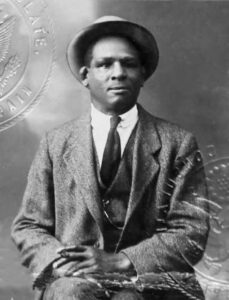Sam Langford Fights tus Dixie Kid
Raws li kuv tau sau ntawv nyob rau hauv ntau posts, Qhov zoo heavyweight boxers ntawm 1900 thiab 1919 Tau cov neeg Asmeskas-American boxers yuam mus tua sib rau cov “Xim Championship”. Txawm tias tom qab tus poj Jack Johnson thaum kawg rhuav cov kab xim thiab yeej lub ntiaj teb Heavyweight Championship, Nws yuav tsuas cug lub npe tiv thaiv contenders dawb contenders.
Yog li ntawd, the toughest challengers were never given an opportunity to win the recognized World Heavyweight Championship. One of the black fighters, who would almost assuredly been World Champion at some point was Sam Langford. An Afro-Canadian born in Nova Scotia in 1886, Langford was successful as a lightweight, welterweight and heavyweight.

Lub zoo Sam Langford los ntawm cov pej xeem sau ntawv
Nyob rau lub ib hlis ntuj 10, 1910, Langford was the recognized Colored World Heavyweight Champion. He was in Memphis, Tennessee, to defend his title at the Phoenix Athletic Club against former welterweight champion the Dixie Kid.
The Dixie Kid was born Aaron Lister Brown on December 23, 1883 hauv Fulton, Missouri. Nyob rau hauv 1904, he won the welterweight title via disqualification in the last round of a fight he was clearly losing to Barbados Joe Walcott.
The title win was later set aside, when an investigation revealed that referee “Duck” Sullivan had a large bet on the Dixie Kid to win the fight. The Kid continued fighting and had a solid, not spectacular, career.
While Langford was a small heavyweight at 185 mus 190 phaus, he outweighed the Dixie Kid by 25 pounds for this bout. Langford had also defeated the Kid in only five rounds the previous September.
This fight wasn’t much different than the first bout. Langford needed less than the three rounds to beat the Kid, who was knocked down 9 times before Langford knocked him out in the 3rd round. Each time Langford knocked the Dixie Kid down, he would remain on one knee for the full 9 seconds before returning to the fight.

Aaron Lister Brown aka the Dixie Kid from his 1919 passport (Public sau)
At the time of the match, newspapers discussed the fact that after this fight both Langford and the Dixie Kid were planning to travel to France for several bouts. Many black fighters, such as Sam McVea and Joe Jeanette, found more opportunities in Europe than the United States at the time.
The Dixie Kid retired in 1922. Nws tuag thaum 50 years of age after falling out of a Los Angeles tenement window. The cause of the fall couldn’t be determined.
Langford retired in 1926 at 43-years-old. Langford was blind at the time of his retirement. He moved back to his adopted home state of Massachusettes, qhov uas nws tuag nyob rau hauv 1956 at 69-years-old.
Koj yuav tawm ib saib los nug cov lus nug txog qhov no los yog tej tsev xa rau kuv Facebook phab.
Qhov chaw: The Bridgeport Times and Evening Farmer, Lub ib hlis ntuj 11, 1910 ib tsab, p. 7 thiab Evansville Press, Lub ib hlis ntuj 10, 1910 ib tsab, p. 6
Pin It
